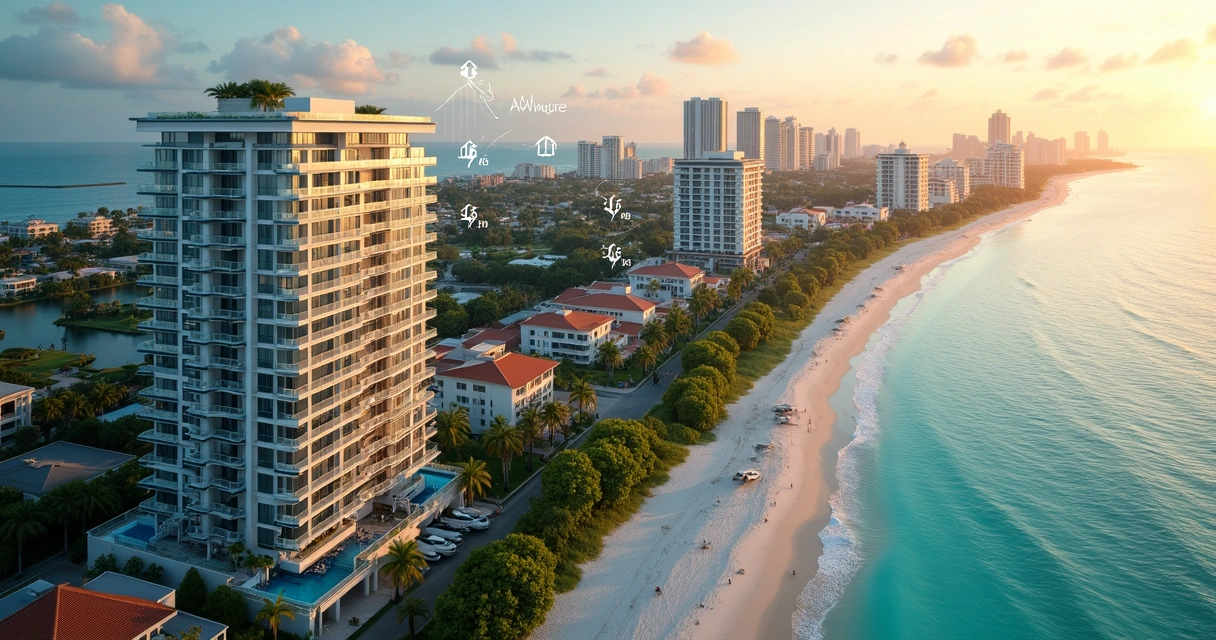If you’ve ever wondered how investors build property portfolios in North Carolina—sometimes without showing personal income—this guide is for you. There’s an approach that places the property at center stage, where its own earning power is what truly counts. This is the Debt Service Coverage Ratio (DSCR) loan, a powerful solution opening doors for local and international investors alike.
Making sense of DSCR loans: what they are, and why they matter
Let’s start simple. A DSCR loan is a mortgage designed especially for real estate investors. The main idea? The decision to lend is based on the income that the property itself can bring in, not on your personal salary. In other words, if a property can pay for itself, you have a shot.
It’s not about your paycheck. It’s about the building’s rent.
Unlike traditional home loans where underwriters focus on your personal tax returns, pay stubs, and debts, with DSCR financing, the only real question is: will the rent cover the mortgage and related costs?
This method is especially popular among:
- Investors owning multiple properties
- Self-employed individuals
- Real estate entrepreneurs using short-term rental income
- Overseas buyers with little or no U.S. tax history
For borrowers who don’t fit in a neat box, DSCR loans create an opportunity for scalable growth and flexibility they can’t get elsewhere. As explained on offermarket.us’ resources, the property's cash flow is the gatekeeper and the key.

The core of DSCR loans: measuring income versus debt
So what is Debt Service Coverage Ratio, and how is it calculated? Simply put, it's a way of measuring whether the income from a property will cover the loan payment.
The basic formula:
- DSCR = Net Operating Income (NOI) / Debt Service
If you’re still following, NOI is just the property’s gross rental income minus expenses (things like property taxes, insurance, and maintenance). Debt Service is the sum of all mortgage payments (principal and interest).
Example time. Let’s say you buy a duplex in Charlotte. Each side rents for $1,200 per month, so the total gross rent is $2,400. Expenses are $400 monthly (taxes, insurance, etc.). The mortgage payment is $1,500 per month.
- NOI = $2,400 – $400 = $2,000
- Debt Service = $1,500
- DSCR = $2,000 ÷ $1,500 = 1.33
A DSCR of 1.33 means the property generates 33% more income than needed to pay the mortgage. Most DSCR loan programs in North Carolina require this number to be above a certain threshold—commonly 1.0 to 1.25 according to offermarket.us.
Who can get a DSCR loan? typical eligibility criteria
Curious if you could qualify for DSCR mortgage programs? The criteria feels different from what you’d expect from personal home loans—and quite a bit more flexible. Here’s what lenders usually consider:
- Minimum DSCR ratio: Most require DSCR above 1.0, sometimes 1.25 or 1.5. The higher, the stronger your application.
- Credit score: While personal income isn’t scrutinized, a reasonable credit score is still needed. Often a 620 minimum, as noted by mofinloans.com, but some cases go lower or require more for better rates.
- Down payment: Typically, 20-25% (again, see mofinloans.com).
- Property types: Single-family homes, multifamily up to four units, condos, townhouses, and even some commercial buildings.
- Experience: Not always needed, but some lenders give better terms to seasoned investors with proven property-management history.
- Loan limits: These are usually pretty generous, helping you finance more expensive rentals or even multiple at once.
Ultimately, a DSCR loan is more accessible for those who want to scale investment but don’t fit the “standard” borrower mold. That’s something Heart Mortgage sees daily, guiding both first-time and experienced investors in their search for flexible, property-focused solutions.
Benefits of using DSCR loans for investment in North Carolina
Bringing DSCR loans into your playbook comes with a list of clear upsides, especially if your real estate ambitions extend beyond just one property. Let’s break them down:
- Bigger loan amounts compared to some personal loans, so you can buy pricier or multiple buildings.
- Multiple properties in your portfolio, since approval isn’t tied only to your personal earnings.
- Flexible documentation, allowing for minimal paperwork about your own taxes and pay.
- Payment options that fit different goals—choose from 30- or even 40-year terms, and sometimes interest-only periods (launchfg.com).
- Foreign nationals welcome. International investors, even those without U.S. credit or income, are often eligible—just focus on the property’s numbers.
- Easier scaling for those who wish to move from one to many investments quickly.
A good deal will pay for itself. Lenders know it, and so should you.
Heart Mortgage creates custom guidance for each scenario, helping clients assess if DSCR financing is the key to their portfolio or if another program, such as conventional mortgage loans, will suit them better.
Cash flow analysis and property appraisal: more than a formality
It may sound obvious, but the heart of DSCR lending is a clear, honest picture of what the property can bring in. This is why lenders want not only the numbers, but also a reliable projection.
For the assessment, expect to provide:
- Current leases or estimated fair-market rent
- Historical occupancy (if it's already rented)
- Itemized expenses, preferably with documentation
- A full property appraisal showing value and rental comparables
Mistake here, and the deal may not work out as planned. Whether you are a local or a foreign buyer, as launchfg.com notes, working with experienced appraisers and having clean, transparent documentation of your income analysis helps the process move faster and smoother.

The application journey: DSCR loans step by step
Applying for a DSCR mortgage in North Carolina isn’t a marathon, but it’s also not quite a sprint. Knowing what to expect can help you avoid common surprises:
- Initial pre-qualification: Discuss your property target and estimated rents with a DSCR lender. They will give you a range for loan amount and rates, so you can shop with purpose.
- Submit your application: Provide basic personal info, property address or purchase contract, and initial documentation.
- Property analysis: Send over current and projected rental documentation, expenses, and other relevant info.
- Appraisal and review: The lender will order a property appraisal to confirm value and potential rent.
- Conditional approval: Assuming all lines up, you'll get a commitment letter—sometimes “conditional” while a few final details are checked out.
- Closing and funding: Once everything’s in order, sign the final documents and the loan is funded.
Turnaround times can be as quick as 2-3 weeks if paperwork is neat and the building’s data checks out. Heart Mortgage walks each client through these steps, clarifying questions and removing guesswork—whether applications come in online, by phone, or in person.
DSCR loans vs. traditional financing: how it really differs
Traditional mortgages are great for owner-occupiers with stable jobs, W-2s, and simple finances, but they often fall short for investors. DSCR loans pick up the slack.
- Income basis: Traditional: Approval is about your personal income, job stability, and tax returns. DSCR: Approval is based on projected rental cash flow. No need for W-2s or tax returns.
- Number of financed properties: Traditional: Many lenders cap you at 4-10 mortgages. DSCR: It’s about the property, not a set limit.
- Debt-to-Income (DTI) ratio: Traditional: DTI limits can stop growth. DSCR: No DTI headaches—just focus on rental coverage.
- Who qualifies: Traditional: U.S. citizens or residents with local earnings. DSCR: Domestic or international investors welcome.
Where your income comes from doesn’t matter. The doors are open if the rental numbers work.
DSCR financing can help you scale up to five, ten, or more properties, and can be used alongside other loan types. If you’re curious about more specifics or want to see how programs compare, Heart Mortgage shares loan calculators and FAQs at heartmortgage.com/calculators and heartmortgage.com/faq.
Opportunities for investment in north carolina: market outlook
What makes North Carolina such a magnet for investors? Start with population growth, affordable living, and a highly diverse economy. Property developers and rental owners are attracted to cities like Charlotte—considered a financial hub—along with Raleigh-Durham, which is energizing rental demand due to the tech sector and major universities. These trends are highlighted in findings from malvecapital.com and prosperaloans.com.
Here are some of the stand-out markets:
- Charlotte: Huge demand for both single- and multifamily rental homes as finance and tech jobs continue growing (malvecapital.com).
- Raleigh-Durham: Universities drive long-term rental need—think students, tech workers, and visiting faculty (prosperaloans.com).
- Asheville: Known for its art scene and tourism, it’s ideal for short-term rental strategies, especially if combined with thoughtful amenities (flipsquad.io).

Of course, there are always risks—hurricanes, floods, and shifts in job growth all play a role. That’s why steady planning, property insurance, and location selection are so important. (Sometimes, more than we realize at first glance.)
Cases and scenarios: bringing DSCR loans to life
Let’s make this practical. Below are two examples reflecting the kind of investors Heart Mortgage often sees, showing how DSCR lending creates very different pathways to property ownership.
Case 1: Scaling up with DSCRJorge owns three rentals across North Carolina, all cash-flowing steadily. His bank turns him away when he applies for another mortgage, citing too many loans in his name. He switches to a DSCR lender, which focuses on the fourth property’s projected rent—no questions about his day job. Fast forward, Jorge closes on another property, his DSCR stands at 1.4, and he has a clear plan to keep expanding.
Case 2: An overseas buyer enters North CarolinaCamila, living in Brazil, wants to buy a townhouse for long-term rental in Raleigh. She has no U.S. work history or credit score, but the property estimate suggests a DSCR of 1.5. With a higher down payment, Camila secures DSCR financing from a specialist lender, and Heart Mortgage guides her through the process—remotely, in Portuguese, matching every document to U.S. lender requirements.

Every scenario is different. That’s why Heart Mortgage provides tailored guidance at every step, with communication options as varied as their clients—by phone, chat, in person, or email. For those who want details on specific loan programs, property types, or approval steps, their loan program page lays out all available options.
Final thoughts: planning, patience, and partnership
DSCR financing isn’t for everyone—but it’s a powerful approach for investors who want to unlock property value without being boxed in by personal income checks. From Charlotte to Asheville, apartments to duplexes, this loan type can be life-changing for those open to navigating its rules carefully.
The property’s potential matters most. Your plan comes next.
For those thinking about their next—or first—investment in North Carolina, taking the time to assess risks, run rent numbers, and seek expert help will shape your experience and your success. Connect with Heart Mortgage if you want help turning investment plans into real opportunities. They’re there for every step, helping you reach your homeownership or portfolio goals, whatever your starting point. Reach out through their contact page and start a new chapter with confidence.
Frequently asked questions about DSCR loans in North Carolina
What is a DSCR loan in NC?
A DSCR loan in North Carolina is a type of real estate financing where approval focuses on whether the property's rental income can cover the mortgage and related expenses. Lenders calculate the Debt Service Coverage Ratio (DSCR) to make decisions, meaning your personal income matters less—what matters is that the building can pay its own way. These loans are often used by investors, both local and international, to build rental portfolios without the hurdles of traditional income verification. You can find more details about loan types and requirements in Heart Mortgage’s program section or at resources like offermarket.us.
How do I qualify for a DSCR loan?
To qualify for a DSCR loan in North Carolina, you’ll generally need a debt service coverage ratio above 1.0 (some lenders ask for 1.2 or higher). A minimum credit score—often around 620—is required, plus a down payment of 20-25%. Lenders will review projected or existing rent, analyze property operating expenses, and get a professional appraisal. International buyers may be asked for a bit more documentation or a bigger down payment, but the focus stays on property income. You can review step-by-step qualification details in guides on eligibility.
Is a DSCR loan worth it for investors?
For many investors, yes. DSCR mortgages make it feasible to buy more properties, especially if your personal income is complex or you want to scale faster. The ability to qualify based on a property's cash flow opens doors for building a diversified investment portfolio and for international or self-employed buyers who might face barriers with typical banks. Still, it's good to weigh loan terms, interest rates, and your comfort level with property management. Efficient planning and honest property analysis will have a big impact on your returns over time.
Where can I find DSCR lenders in North Carolina?
DSCR lenders in North Carolina include both specialized investment loan firms and some community banks or mortgage brokers. The team at Heart Mortgage is well-versed in DSCR qualifications and options, helping clients through each step of the process with clear advice. If you want to learn more, contact Heart Mortgage's advisors, or research DSCR programs outlined by regional lenders discussed in resources like launchfg.com.
What are the current DSCR loan rates in NC?
DSCR loan rates in North Carolina vary based on loan terms, property type, credit profile, and even the specifics of the property you’re financing. Generally, these rates may run a bit higher than standard owner-occupant mortgages but come with greater flexibility for documentation and eligibility. Adjustable-rate and fixed-rate options are available, sometimes with interest-only features. To compare rate scenarios or estimate possible payments, try the Heart Mortgage loan calculator for the most current information.





